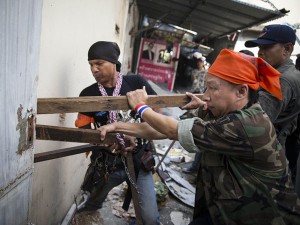Thai firms feel squeeze from crisis, seek solution

Anti-government protesters break down a door as they search dilapidated buildings near the scene of an explosion in the Pathumwan district, Friday, Jan. 17, 2014, in Bangkok. AP
BANGKOK, Thailand—Hotel occupancy rates in central Bangkok have plunged. Conventions have been canceled. Business deals have been postponed. Tourist bookings for coming months are way down.
The latest spasm in Thailand’s near decade of political upheaval is taking an economic toll as anti-government protesters barricade Bangkok’s major intersections and confrontations between protesters and supporters of Prime Minister Yingluck Shinawatra periodically flare into deadly clashes.
Since a 2006 coup ousted Yingluck’s brother Thaksin Shinawatra as prime minister, Thailand’s economy has bounced back from several episodes of violent political conflict. However, the underlying failure to resolve deep divisions in Thai society has diminished its reputation as a reliable country for foreign business and raised the prospect of ever increasing instability.
Southeast Asia’s second-biggest economy could wallow below three percent growth this year, if the anti-government protests continue into the second quarter, the University of the Thai Chamber of Commerce projected. That is far below potential for Thailand, one of the world’s top tourist destinations and a base for global companies in industries from autos to hard drives. As recently as 2012 the economy grew 6.5 percent and growth of nearly four percent will be reported for 2013 when official figures are released.
“It’s terrible. It’s worse than ever. We can’t see an end to it,” said Virat Jaturaphutphitak, vice president of the Association of Thai Travel Agents. Reservations from European and North American travelers to Bangkok through April are down 70 percent. Bookings from Asia are down 30 percent. “If this situation continues, we will have to close many businesses.”
Article continues after this advertisementCorporate leaders fret that foreign investors planning new factories and business ventures will turn to neighbors such as Malaysia, Vietnam and Singapore if the conflict drags on.
Article continues after this advertisementWorries of a violent showdown increased after Yingluck’s government said it will press ahead with elections this Sunday, overriding objections from the Election Commission.
Demonstrators are expected to block voting centers and the opposition Democrat Party is boycotting the election. Since the end of November, 10 people have died and more than 570 have been injured in the conflict. Protest leaders want Yingluck’s elected government replaced with a “people’s council” that would implement reforms such as rooting out corruption.
Yingluck, supported by the country’s poor rural majority in its north and northeast, has proposed some reforms but insisted that any changes must come after elections.
“The perception from foreign clients is pretty bad. They don’t want to come. Business stops and is put on hold,” said Thinawat Bukhamana, a managing partner at law firm Baker & McKenzie Ltd. in Bangkok. He said some corporate financing deals his firm is involved in have been put off.
Tourism and Sports Minister Somsak Phureesrisak said hotels near the protest sites in Bangkok, as well as in hotels in nearby provinces that cater to foreign tourists, have suffered dramatic falls in occupancy rates to about 30 percent, far below normal for this time of year, considered Thailand’s high season.
Political stability is a factor in whether Toyota Motor Corp. invests further in Thailand, the automaker’s Thailand chief Kyoichi Tanada said at a press conference earlier this month.
Thailand is a production and export base for the Japanese automaker, whose four factories here churned out nearly 800,000 vehicles last year. Tanada hoped production could reach 1 million in three to four years, a goal that would probably require another 15 to 20 billion baht ($455-$610 million) of investment, he estimated.
Seven businesses organizations including the stock exchange and tourism council have banded together since December to play a mediating role between Yingluck and protesters, but have been unable to get the two camps together.
“It’s very difficult because each side seems like they cannot pull back even one step,” said Vichate Tantiwanich, senior vice president of Thai Beverage PCL, maker of Chang beer.
The coalition has tried to serve as a “middle ground,” said Kalin Sarasin, secretary-general of the Thai Chamber of Commerce. “At the moment, they don’t talk.”
Lack of success at mediation might not be surprising. Business leaders are perceived to be more sympathetic to the protesters, so some experts question whether they can be a neutral mediator.
RELATED STORIES
Thailand declares state of emergency for protests